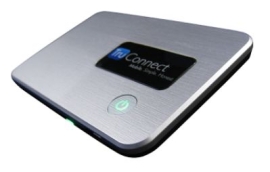C Spire Wireless, a small, southern wireless provider formerly known as Cellular South, has an ambitious plan to build a fast, 4G LTE network to reach its 900,000 customers. To do it, C Spire bought $192 million worth of 700 MHz wireless spectrum, which is considered some of the most valuable wireless spectrum that’s still available because it can travel long distances and penetrate obstacles.
But there’s a problem. C Spire claims it hasn’t been able to use this spectrum and hasn’t been able to deploy its 4G network. It says the bigger carriers, especially AT&T, have used their market power to ensure chip designers and device makers make equipment compatible with their flavor of the technology, leaving smaller carriers in the cold. And without devices and network gear, C Spire says it’s been sitting on a costly resource it can’t use — and thus can’t deliver to you, the consumer.
“We will deploy our 4G LTE network,” said Eric Graham, C Spire Wireless’ senior vice president for strategic relations. “But the fact that AT&T is using a different band plan [that is, a set of technical standards for equipment] in the 700 MHz spectrum has slowed things down. At least initially we’ll be using other spectrum other than the 700 MHz spectrum we bought for 4G. But eventually, we are going to need that spectrum to add more capacity to our network.”
In the wireless industry, it seems, you can never have too much spectrum. Even AT&T and Verizon Wireless, which together control about 70 percent of the wireless market, say they need more of it. But even if you have enough spectrum, as C Spire argues, the big guys can use their leverage with suppliers to make it darn difficult for you to use it.
Can you imagine what would happen if the industry giants further solidified their hold on the market by hoarding even more spectrum? Bad things, those underdogs would assure you, starting with higher costs for consumers and fewer innovations. And that, they say, is why regulators and judges need to intercede.
“We are at a critical time in the evolution of the wireless industry,” said Kathleen Ham, vice president of federal regulatory affairs for T-Mobile, in an interview with CNET. “And as we transition to 4G LTE, spectrum is a key part of the strategy and survival of every carrier. And it’s the duty of the regulators to ensure that we don’t end up with a market of spectrum haves and have-nots.”
MORE: The coming wireless spectrum apocalypse and how it hits you | Mobile – CNET News.




